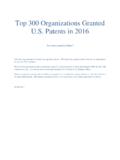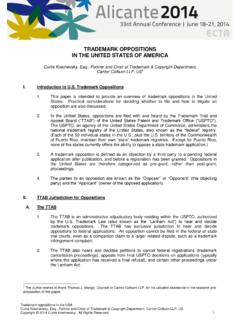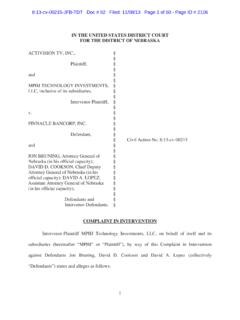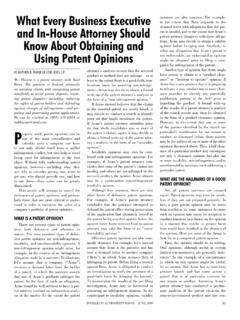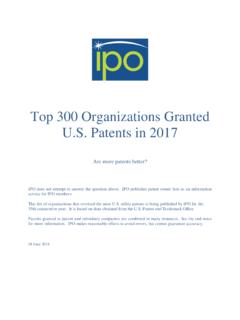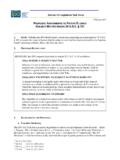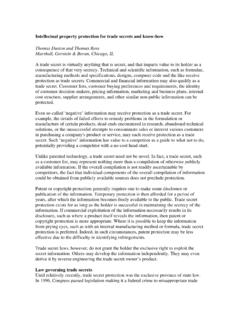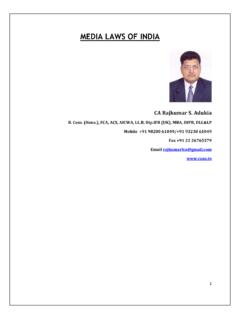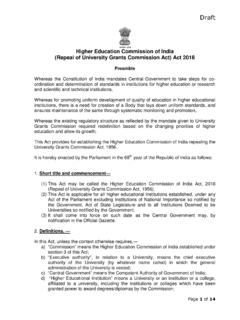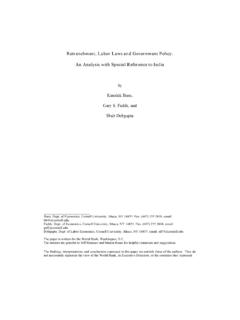Transcription of PATENT PROCUREMENT IN INDIA
1 PATENT PROCUREMENT IN INDIA Authors: Manoj Pillai, Partner, LEX ORBIS IP Practice, New Delhi, INDIA Mrinalini Kochupillai, Intellectual Property Law Consultant, New York Vineed Abraham, LEX ORBIS IP Practice, New Delhi, INDIA Abhai Pandey, LEX ORBIS IP Practice, New Delhi, INDIA Raj S. Dav , , Partner, Darby & Darby Michael Lin, Proctor and Gamble Company Miku H. Mehta, Associate, PATENT Attorney, Sughrue, Mion PLLC Ami Patel Shah, Senior PATENT Attorney, Intel Wireless Platform Group Ajit J. Vaidya, Partner, Hogan & Hartson LLP Introduction: This paper has been created under the leadership of Mr.
2 Edward Blocker, Chair of the Intellectual Property Owners Association ( IPO ) Asian Practice Committee, to provide background to IPO members on the subject of obtaining patents in INDIA . It should not be construed as providing legal advice or as representing the views of IPO. The Indian PATENT Law of 1970 and the Amendment of 2005 are available on-line at the Indian PATENT Office Website at: and , respectively. Table of Contents Page 1. Introduction to PATENT Laws in INDIA 1 The PATENT Act, 1970 1 Pre-Independence Legislative History 2 Post-Independence Developments 3 Post-TRIPS amendments 4 The PATENT Rules, 2003 5 2.
3 PATENT Administration in INDIA 6 The Office of Controller General of Patents 7 Hierarchy of Officers in PATENT Office 7 Powers of the Controller 8 Intellectual Property Appellate Board 11 Composition of the Appellate Board 12 Powers and Jurisdiction of the Appellate Board 12 3. Patentability 12 Statutory Provisions 13 Exceptions Before 2005 14 Exceptions After 2005 Amendment 17 Novelty 19 Inventive Step/Non Obviousness 19 Industrial Applicability/Utility 21
4 Patentable Subject Matter 21 Page ii Patentability Issues 24 Pharmaceutical Substance 24 Micro Organism 26 Plants 26 Software 27 Traditional Knowledge and Bio Diversity 27 4. The Application 28 Ordinary Application 28 International/PCT Application 30 Convention Application 31 Application for Addition 32 Divisional Application 32 Specification 33 Provisional Specification 33 Complete Specification 34 Claims 35 Disclosure Requirements 35 Duty to Disclose 35 Foreign Filing License 36 5.
5 Prosecution 37 Filing of the Application 37 Publication 38 Request for Examination 38 Pre-Grant Opposition/Representation 39 Wrongful Obtaining 40 Prior Publication 40 Prior Claiming 40 Page iii Prior Public Knowledge or Public Use 40 Obviousness or Lack of Inventive Step 41 Claim not a Patentable Invention 42 Invention not Sufficiently and Clearly Described 42 Failure to Disclose Information Regarding Foreign Application 42 Convention Application Time Barred 42 Non-disclosure of Origin of Biological Material 42 Prior Knowledge in Local or Indigenous Community 43 Examination 43 Search & Investigation 44 First Examination Report 44 Putting Application in Order for Grant 45 Intimation for Grant 45 Grant 45 Publication of Grant 46 6.
6 Post Grant Opposition 46 Notice of Opposition & Written Statement 46 Constitution of Opposition Board 47 Reply Statement and Evidence by Patentee 47 Filing of Reply Evidence by Opponent 47 Hearing 47 7. Conclusion 48 1 1. Introduction to PATENT Laws in INDIA The Patents Act, 1970 The provisions of the PATENT Act, 19701 (hereinafter referred to as the 1970 Act ) govern the PROCUREMENT and grant of patents in INDIA (Non-substantive procedural issues relating to the PROCUREMENT & granting of patents are governed by the PATENT Rules and not the 1970 Act).
7 Section 159 of the Act, requires the Central government to frame rules2 to administer and carry out the intent of the Act. The Act was kept in abeyance till the formulation of rules. The rules came into force on April 20, Thus, the 1970 Act (except for certain sections) came into force on April 20, 1972 . The remaining sections of the Act came into force on April 1, Since its enactment, the Act has been amended on five occasions by: The Repealing and Amending Act, 1974 (Act 56 of 1974) The Delegated Legislation Provisions (Amendment) Act, 1985 (Act 4 of 1985) The Patents (Amendment) Act, 1999 (17 of 1999) The Patents (Amendment) Act, 2002 (38 of 2002) The Patents (Amendment) Act, 2005 (15 of 2005) 1 Act No.
8 38 of 1970. The 1970 Act came on the Statute book on 19th September 1970 was after being passed by both Houses of Parliament and receiving the assent of the President. The 1970 Act has undergone three major amendments by: The Patents (Amendment) Act, 1999, Act No. 17 of 1999; The Patents (Amendment) Act, 2002, Act No. 38 of 2002; The Patents (Amendment) Act, 2005, Act No. 15 of 2005. [The 1970 Act, as amended till date has been referred to hereinafter as the Patents Act, 1970. ] 2 159 of the Patents Act, 1970 (id) states: Power of Central government to make rules- (1) The Central government may, by notification in the Official Gazette, make rules for carrying out the purposes of this Act.
9 3 The Patents Rules, 1972, published in S. O. 301 (E) dated 20th April 1972 in Gazette of INDIA Pt. II, Section 3 (ii) 4 12(2), 13(2), 28, 86 and 125 to 132 of the 1970 Act came into force on April 1, 1978 vide S. O. 799, dated 10th March, 1978 published in Gazette of INDIA , Pt. II, 3 (ii), p 764. 2 The first two amending Acts listed above reflect the changes driven within INDIA , while the later three amending Acts made substantive changes to the Indian PATENT laws in order to meet INDIA s obligations under At present, the Patents Act, 1970 is a collection of Twenty-three Chapters each dealing with various principles/aspects involved in the grant of patents in Pre-Independence Legislative History The Indian PATENT laws have their roots in the English PATENT system.
10 The English PATENT system originated from the Royal prerogative power to grant monopolies. In INDIA , however, the PATENT system is a statutory creation. The question whether to grant patents in INDIA was of interest to the government as early as 1832. A bill was put forth which empowered the Governor-General of INDIA to grant PATENT The original goal of the bill was to extend the protection of patents granted in England, to INDIA , but this did not take effect due to the legal uncertainties8 associated with extending such rights to INDIA .
